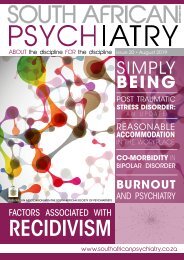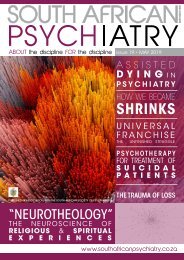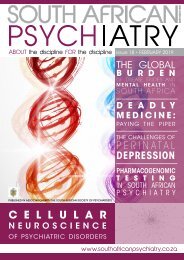South African Psychiatry - November 2020
South African Psychiatry - November 2020
South African Psychiatry - November 2020
Create successful ePaper yourself
Turn your PDF publications into a flip-book with our unique Google optimized e-Paper software.
ADHD CONGRESS
1 ST SOUTHERN AFRICAN MULTIDISCIPLINARY ADHD CONGRESS
excess inflammation. Both early adversity and
biological changes can impact on adult outcomes.
Developmental disorders are collectively common
(1-5%) of the population and approaches include
differentiating between congenital versus acquired
conditions, environmental versus genetic and
combinations of these.
IT IS DIFFICULT TO INTERPRET MULTIPLE
GENETIC TESTING RESULTS SO CAUTION
IS ADVISED AND A DIRECTED MORE
FILTERED APPROACH IS RECOMMENDED.
A reference outlining this approach is suggested:
Fieggen, K. J., Lambie, L. A., & Donald, L. A. (2019).
Investigating developmental delay in South Africa: A
pragmatic approach. SAMJ: South African Medical
Journal, 109(4), 210-213.
PROF PETRUS DE VRIES: INTERVENTIONS FOR
AUTISM
This talk involved a recap of the new categorization
of Autism Spectrum Disorders in the DSM 5 with a
reminder that there are two major domains namely
social affect domain and the restricted repetitive
behaviours.
THERE IS A HETEROGENEITY OF
PRESENTATIONS IN AUTISM INCLUDING
THE CLASSIFICATIONS, PHYSICAL AND
EMOTIONAL MANIFESTATIONS, CULTURAL
AND CONTEXTUAL DIFFERENCES.
Prof de Vries discussed a helpful approach to
consider when deciding on management options
for ASD. This included the following “Ten Principles
for ASD interventions”:
1. Comprehensive Assessment to guide
interventions: including a full history, observation,
mental and family health information, cognitive
and allied health assessments
2. No single intervention is successful for all:
individualized programs are key. Combine
approaches: behavioural, developmental and
educational strategies.
3. Accommodate: work around deficits. Teach
general strategies but it cannot be all that is
done for ASD
4. Build skills: through the core difficulties of ASD.
Teach communication, imitation, play joint
attention etc. An example would be the Early
Start Denver Model.
5. Look for and treat conditions that co-occur with
ASD eg Mental and physical health
6. Focus on Family: management of a child with
ASD must include parents, carers and the
community
7. Early intervention in early years before the
age of 3. Prevents secondary problems for
the child, optimizes outcomes and improves
independence
8. Understand the meaning of the behaviours.
Instead of thinking only about what medication
is best to prescribe, rather ask what is the
meaning or function of the challenging
behaviours
9. Use Evidence Based Interventions – rather than
popular science
10. Parent Education and Training (PET) –
fundamental step in the management
of ASD is to give accurate, important
and meaningful information to empower
parents.
Anusha Lachman is a child & adolescent psychiatrist at
Stellenbosch University. She serves as the Secretary of the Board
of SASOP. Correspondence: anusha.sasop@gmail.com
SOUTH AFRICAN PSYCHIATRY ISSUE 25 2020 * 41
















